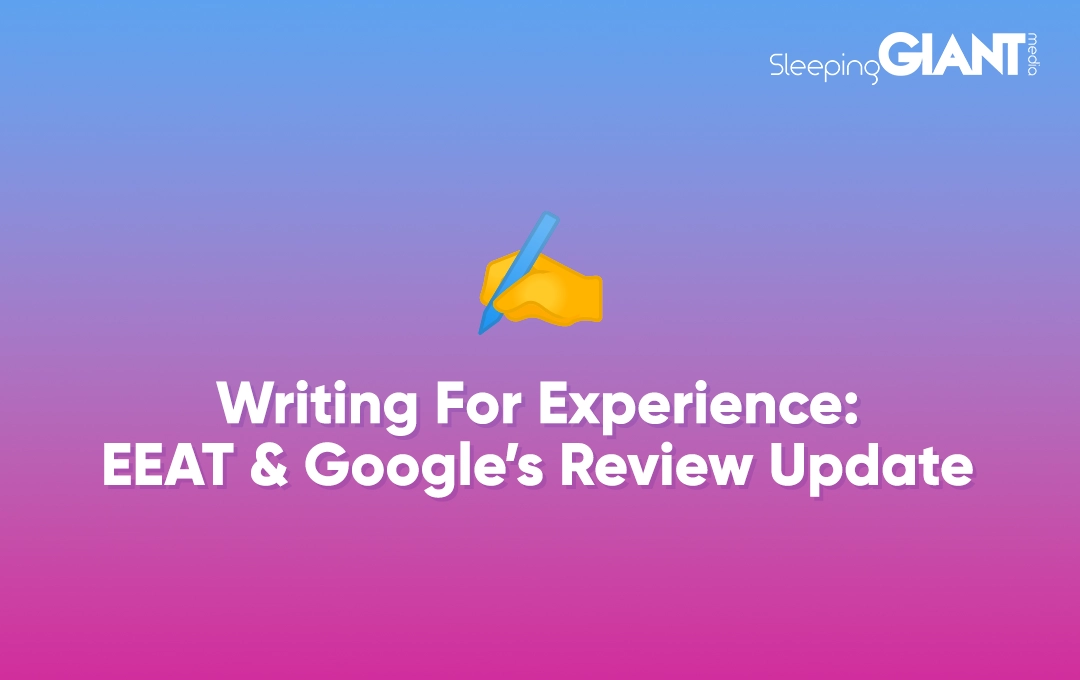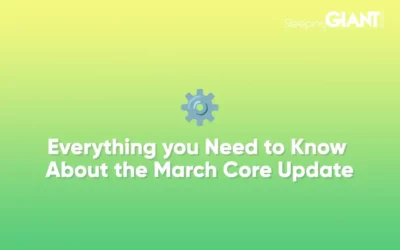
Writing For Experience: E-E-A-T & Google’s Review Update
On the 12th of April 2023, Google launched its new Reviews System Update. Accompanied by a mass of new Search Central documentation, this update offers a clear outline of the kind of content that Google is looking for when it comes to the reviewing of products, services, destinations, and more.
Gone are the days of two-dimensional, disingenuous reviews. Now, in alignment with the rapid increase in importance of user-first content and, of course, Google’s addition of Experience to the E-E-A-T acronym, more is demanded from written evaluations and recommendations.
If you’re looking for advice when writing review-style content or, in fact, any content that requires a degree of experience, read on.
Google’s review system
The April update goes one step further than Google’s previous product review updates, no longer confined to singular reviews of products, it extends to appraisals or evaluations of any reviewable topic — as indicated by the name change from ‘product reviews’ to ‘Reviews System’.
The following things are now included:
- Businesses
- Services
- Destinations
- Events
- Media (films, games, etc)
But what’s the reason behind this update? Google has claimed that specifying what ‘good’ reviews look like allows for greater ease when it comes to rewarding and promoting quality reviews than placing an emphasis on experience (their latest fixation). Let’s examine exactly how this new reviews system will work.
How does the reviews system work?
The reviews system works to ensure that users see reviews sharing in-depth research as opposed to thin, summary content.
The system is designed to evaluate content on a page-level basis, including: articles, blog posts, pages or similar first-party standalone content that is written with the purpose of providing a recommendation, giving an opinion, or providing detailed analysis.
If your site happens to have a lot of review content, a site-wide evaluation may occur, but this is rare. It is important to note that this system does not take into consideration third-party reviews, such as those posted by users in forums or the reviews section of a product or services page.
Writing for experience
Back in December of 2022, we were met with the introduction of ‘Double Eat’ (or E-E-A-T) when Google added Experience to the Expertise, Authority, Trustworthiness acronym that’s been in its Search Quality Rater Guidelines since March of 2014.
It is evidence of this Experience that Google’s Review System is seeking in order to know which content to promote.
This increased importance of reviews, experience, and topic knowledge has significant implications for content and content writers alike. Not only will we have to change the way we think about review-style content, but we’ll need to learn to change the way we write, too.
But what does writing for experience actually look like?
While there is no one winning formula that will guarantee your reviews perform well, adding statements that indicate first-hand experience are likely to help.
As an example, according to Search Engine Journal, there have been anecdotal accounts that state that including phrases like “in my experience” or “my hands-on analysis” in reviews has caused webpages to increase in their ranking on the SERP (Search Engine Results Pages).
However, fake signals of experience are not best practice and it is always best to include actual evidence of experience such as original photos and data (where possible).
Signals of experience: Beyond the written word
You may well remember Google’s MUM (Multitask Unified Model) update that launched back in May of 2021. In this update, we saw a huge new emphasis on things other than the text — image files, videos, audio files — when it comes to deciphering the meaning of a page.
Well, Google’s new documentation for the Reviews System does something pretty similar, listing the following ‘signals of experience’ for reviews:
- Visual evidence
- Audio evidence
- Links to evidence of experience
- Quantitative measurements
The idea being that the above signals can act as evidence that a product has been tested and handled or a destination has been explored or visited, and so on.
Technical SEO can help
Technically also beyond the written word, technical SEO can significantly help with adding authenticity to your reviews. Google has specified that it is helpful to ensure your structured data reflects the item, product, or entity you are reviewing.
If it is a product, using product structured data will help Google better identify it and allow the review to appear for the right queries and in the right places. You can find out more about product structured data here.
How to write effective reviews
Weaving these signals of experience naturally into quality content is a must when writing reviews of any sort — but it can be tricky. So, to take advice straight from the horse’s mouth, we’ve summarised what Google has to say about writing effective reviews below:
In order to write high quality reviews of products, services, destinations, and more, the following best practices are key:
- Evaluate things from a user’s perspective: what are the pain points, what did you do, what could be better for users?
- Reinforce the authenticity of your review by supplementing it with evidence. This can take the form of audio & visual files or links to other supporting accounts.
- If possible, include quantitative measurements that elaborate on the performance and quality of a service or products.
- Give context to a product or service, explain how it has evolved over time and how it differs to other, previous versions.
- Use expert knowledge about the topic at hand, going into detail to demonstrate you are an expert. This can take the form of showing industry knowledge by comparing the thing being reviewed to competitors or industry standards.
- Use reliable findings or your own research to evaluate the advantages and disadvantages of a product or service — honesty is key here to gain your users’ trust.
- Focus on the most important decision-making factors. If you’re reviewing a car seat, safety and comfort come top, not colour.
- Include links to other useful resources that may influence decision making or make better decisions.
Need help writing content?
What can we take away from this? Well, to risk stating the obvious, writing content — let alone content that Google favours — is becoming more and more of a specialist exercise in plate spinning. Opinions should be backed up, cross-referenced, well-researched, and accompanied by visual or audio material if possible.
If you’d like to take your content further, get in touch with our team of expert content writers today. Or, for more tips and tricks on writing content that Google’s a fan of, keep up with our blog.
Blog
Everything you Need to Know About the March Core Update
We knew it wouldn’t be long before Google released their first core update of...
Giant Wednesday
How To Optimise Images For Websites
Digital Marketing, technology & business insights, how-to's and explainer...
Follow Us
Sign Up For More
Stay up to date with the latest happenings, learnings, events & more with our GIANT Newsletters.
Contact Us
Top Floor, The Civic Centre, Castle Hill Avenue, Folkestone CT20 2QY.




